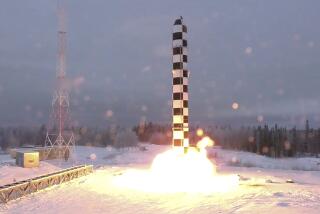Disarmament Demand Upsets Plan for Test Ban
- Share via
WASHINGTON — The Clinton administration vowed Thursday to try to salvage a proposed global ban on nuclear tests after India announced that it will not sign the pact unless the United States and the world’s four other declared nuclear powers first dismantle their arsenals.
The Indian position, announced in Geneva by delegation chief Arundhati Ghose, delivered a body blow to the test ban negotiations.
India is one of three countries that have the technological potential to produce atomic weapons but have not renounced their nuclear ambitions by signing the nonproliferation treaty.
The United States, joined by Britain, has indicated that it is reluctant to allow the test ban to take effect until it is signed and ratified by India, Pakistan and Israel, the so-called threshold states that are widely believed to have produced clandestine nuclear weapons.
The U.S. position, while intended to pressure the three countries to sign the ban, gives them an effective veto over the entire test ban effort, which seemed on the verge of success after more than 20 years of talk.
Although Ghose said the Indian stance is firm, State Department spokesman Nicholas Burns said the United States and its allies will try to reach a compromise with New Delhi before the target date next Friday for completing negotiations. President Clinton and other world leaders want to sign the pact formally this fall at the United Nations.
“We’re in the end game of negotiations,” Burns said. “It’s not surprising in the end game to see some countries take their dissatisfactions and make them public. It’s not surprising that the pace of the negotiations picks up considerably in the end game.”
Ghose said that the proposed treaty is “weak and woefully inadequate” because it does not require the five declared nuclear states--the United States, Britain, Russia, France and China--to get rid of their stocks of weapons.
She complained that the pact would ban only test explosions, without stopping the five declared nuclear countries from refining their arsenals with computer simulations.
Burns rejected India’s demand for total nuclear disarmament.
He said of the declared nuclear states: “All of us will retain--at least for the time being--a nuclear capability.”
Although 61 nations are participating in the test ban talks, the treaty would add new restrictions on just eight: the five declared nuclear states and the three threshold states. The other 53 countries that have signed the Nuclear Non-Proliferation Treaty, renewed indefinitely last year, would be prohibited from engaging in any nuclear weapon activity, including testing.
The five declared nuclear states all support the pending treaty. China was the last to drop earlier objections. Pakistan and Israel have not announced their formal positions.
An Indian government statement said India’s rejection of the test ban does not “automatically” mean the New Delhi government will soon conduct nuclear tests.
“Our decision not to subscribe to the [test ban] in its present form stems from the fact that the negotiations do not meet our minimum expectations with regard to nuclear disarmament policy,” it said.
Burns insisted that the treaty will be a major step toward India’s stated goal of complete elimination of nuclear arms.
“By constraining the development and qualitative improvement of nuclear weapons, the comprehensive test ban treaty constitutes a very effective measure for nuclear reductions in the world, which is one of the points that India has been concerned about,” he said.
More to Read
Sign up for Essential California
The most important California stories and recommendations in your inbox every morning.
You may occasionally receive promotional content from the Los Angeles Times.













